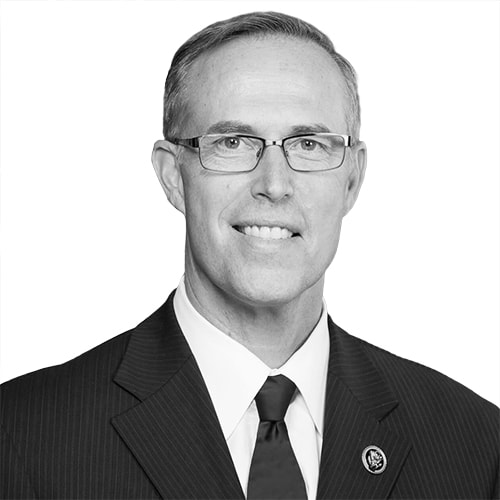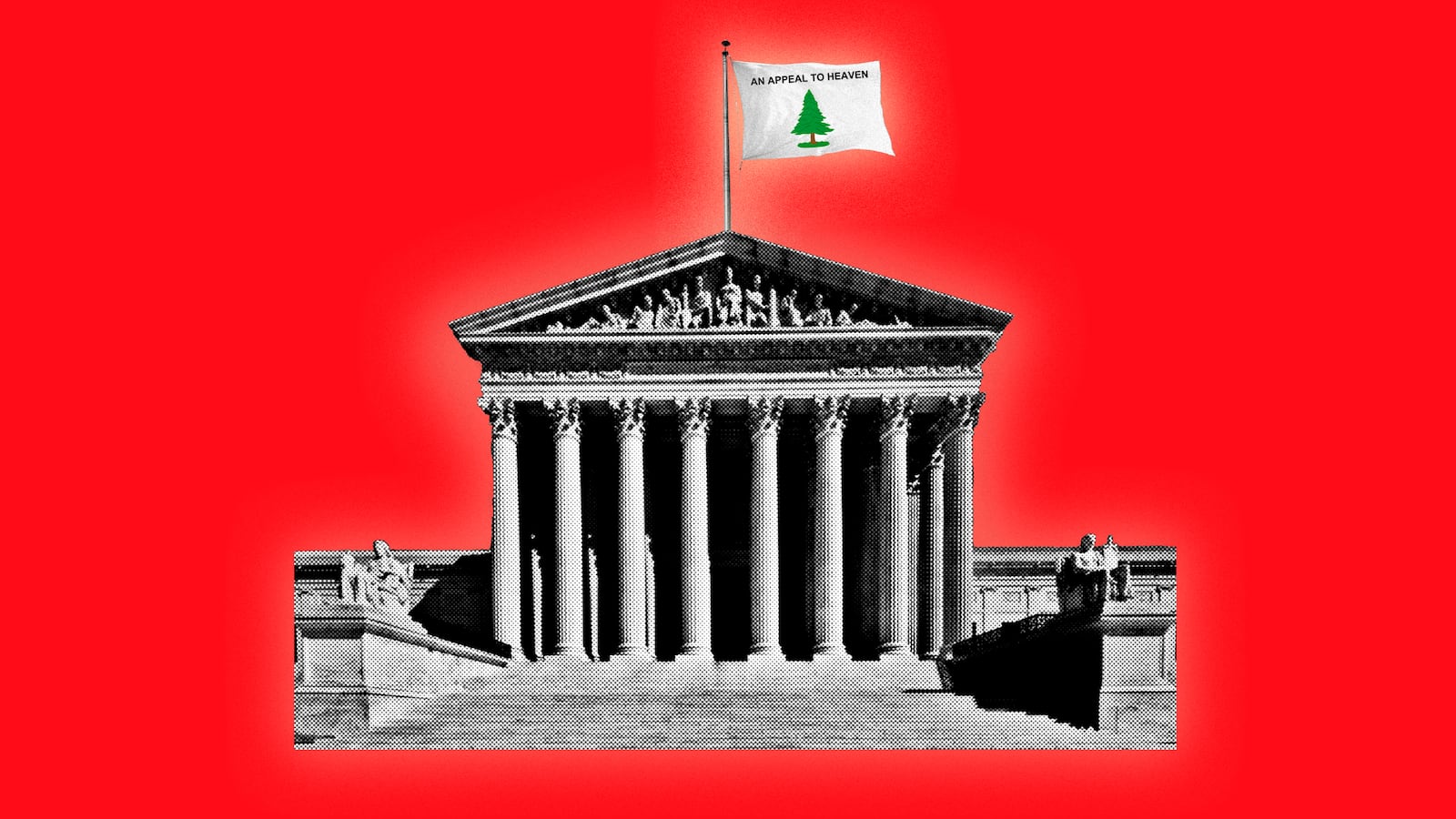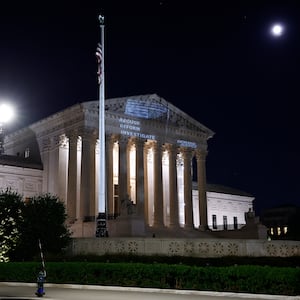As the only open non-believer in Congress, I want to thank Supreme Court Justice Samuel Alito. Not for repeatedly revealing himself as an unethical political partisan who poisons the credibility of the court—I’m disgusted with that, and agree with those who are demanding his recusal in cases involving former President Donald Trump.
But Alito’s latest scandal—flying the “Appeal to Heaven” flag at his New Jersey beach house—makes me grateful, because it might help save our imperiled American democracy.
This proud and undeniable embrace of the extreme Christian nationalist movement sounds an alarm for a nation that has been sleepwalking into theocracy. Coming from a sitting Supreme Court justice, it’s like an air raid siren. And given how far we’ve gone down the road to theocracy, that’s probably what it’s going to take.
No one should be surprised that extreme Christian nationalists—those who conflate Christian and American identity and fuse it with right-wing political ideology—have infiltrated the highest echelons of government. The writing has been on the wall and the flags have been flying in front of the homes and offices of prominent national leaders. They have had so much success at packing courts and elevating elected officials—especially since taking over the Republican Party under Trump—that the leaders of this movement no longer bother to be subtle.
The growing power and influence of Christian nationalism is what led me to do something unheard-of in national politics seven years ago: acknowledge publicly that I’m a Humanist, which means instead of believing in God, I believe in science, reason, and doing good for its own sake.

An "Appeal to Heaven" flag is seen outside of Speaker of the House Mike Johnson office on Capitol Hill on May 23, 2024 in Washington, DC. The flag was toted by rioters who stormed the U.S. Capitol on January 6, 2021. Most recently the flag has been displayed outside of the home of Supreme Court Justice Samuel Alito.
Michael A. McCoy/Getty ImagesI would have gladly kept that private but for my unshakable concern over the extreme religious agenda I saw unfolding all around me, every day, in Washington. I felt compelled to be honest if I wanted to fully confront Christian nationalism as the anti-democracy, anti-America threat that it is.
To advance this work, I co-founded and continue to lead the Congressional Freethought Caucus, which is now the most active group in Congress pushing back against Christian nationalism, defending the rights of religious minorities and non-believers, and upholding church-state separation. But despite our best efforts, most Americans—and indeed most of our colleagues in Congress—still do not understand the scope and gravity of the Christian nationalist threat.
We’ve had previous wake up calls, including the very loud one at the Capitol on Jan. 6, 2021.
Christian nationalism was at the heart of that violent insurrection: “Appeal to Heaven” flags and other Christian symbols were everywhere, as were Christian nationalist pastors who regaled rioters with prayers, prophecies, and citations from the Bible. Experts who have exhaustively studied the religious aspect of Jan. 6 confirm that Christian nationalism was not just part of the story, it was in many ways the story.

Associate Justice Samuel Alito sits during a group photo of the Justices at the Supreme Court in Washington, DC on April 23, 2021.
Erin Schaff-Pool/Getty ImagesBut it remains untold. The media overlooked it, and even the dedicated House Select Committee, which produced an otherwise laudable 154-page report on the insurrection, said nothing about Christian nationalism.
Why? I’ve spoken to several members of the committee who acknowledge the evidentiary record. Former Rep. Adam Kinzinger (R-IL) put it bluntly in an interview: “Had there not been some of these errant prophecies, this idea that God has ordained it to be Trump, I’m not sure Jan. 6 would have happened like it did.”
But here’s the cautionary tale: Rep. Liz Cheney (R-WY)—a profile in political courage for serving on the Committee and daring to speak the truth about Trump—opposed discussion of the subject, issuing a disingenuous public statement via her spokesperson that she “won’t sign onto any ‘narrative’… that suggests every American who believes God has blessed America is a white supremacist.” I admire Cheney for the courage she did show, but on this major element of the insurrection her personal religious ideology caused her to pull punches, resulting in a report that is partially sanitized and incomplete.

An "Appeal To Heaven" flag flying at the Alitos’ house in August 2023.
Google MapsAnother wake up call came in February of this year, with the Alabama Supreme Court’s bombshell ruling deeming frozen IVF embryos to be “people”—a decision steeped in radical Christian theology. Americans were aghast to hear the state’s Chief Justice Tom Parker proclaim the United States a “Christian nation” and boast that he proudly embraces “Seven Mountains Mandate” theology, which calls for establishment of a theocracy with Christian dominance throughout society.
I was encouraged that the media was finally talking about this dangerous movement, but even that moment of candor missed the mark. Parker and his ruling were characterized as outliers with fringe positions. What most in the media missed—and what the American public urgently needs to know—is that Judge Parker is not an outlier. There are many Christian nationalist judges at every level of the judiciary who share this extreme ideology, and I have dozens of colleagues in Congress—including House Speaker Mike Johnson (R-LA)—who embrace the Seven Mountains Mandate.
Perhaps Justice Alito’s “Appeal to Heaven” flag scandal can finally break through the denial, deference, and latent Christian privilege that prevents a serious national conversation about the threat we are facing.
This extreme religious movement has spent decades packing the courts with its allies, including Justice Alito. Indeed, Pastor Dutch Sheets, the Christian nationalist kingpin who exhumed the long-forgotten “Appeal to Heaven” flag and made it one of the most visible symbols of the movement, has an interesting history with Alito. Sheets claims it was his prayers and prophetic decrees that created the high court vacancies filled by Alito and Chief Justice Roberts.
Alito has certainly answered Christian nationalists’ prayers.
He was the driving force behind a stream of Supreme Court opinions that chip away at church-state separation and advance the movement’s theocratic goals—from requiring state governments to fund religious private schools, to forcing public schools to permit Christian prayers at school-sponsored events, to allowing corporations to use religion as an excuse for denying women’s reproductive health care, to barely masking his personal anti-abortion extremism in the disastrous Dobbs decision overturning Roe v. Wade.
Now, with stunning impunity, Alito is flying Dutch Sheets’ “Appeal to Heaven” flag for all to see. He feels untouchable.
The lines are drawn. Christian nationalists are showing their hand with swaggering arrogance, even previewing their dystopic policy agenda in the Project 2025 manifesto. Authoritarian theocracy is definitely on the ballot this November, even if our national discourse still suffers from a reticence to talk about it. Those of us who care about democracy and church-state separation must heed the warnings and spread the word.
As for Alito, of course he should recuse in cases involving Trump. But the “Appeal to Heaven” flag scandal reveals a broader recusal imperative. He openly embraces a political movement that rejects the constitutional separation of church and state and seeks to end our democracy.
This is more than just the appearance of bias; he cannot render impartial justice in matters involving the Establishment Clause and religious freedom, and must therefore recuse in all such cases.
Here’s the good news. Whether you’re a Christian, a follower of another religion, or a Humanist like me, the vast majority of us have common cause: we don’t want to be ruled by a biblical theocracy. The American people will be with us if they understand what’s at stake.









